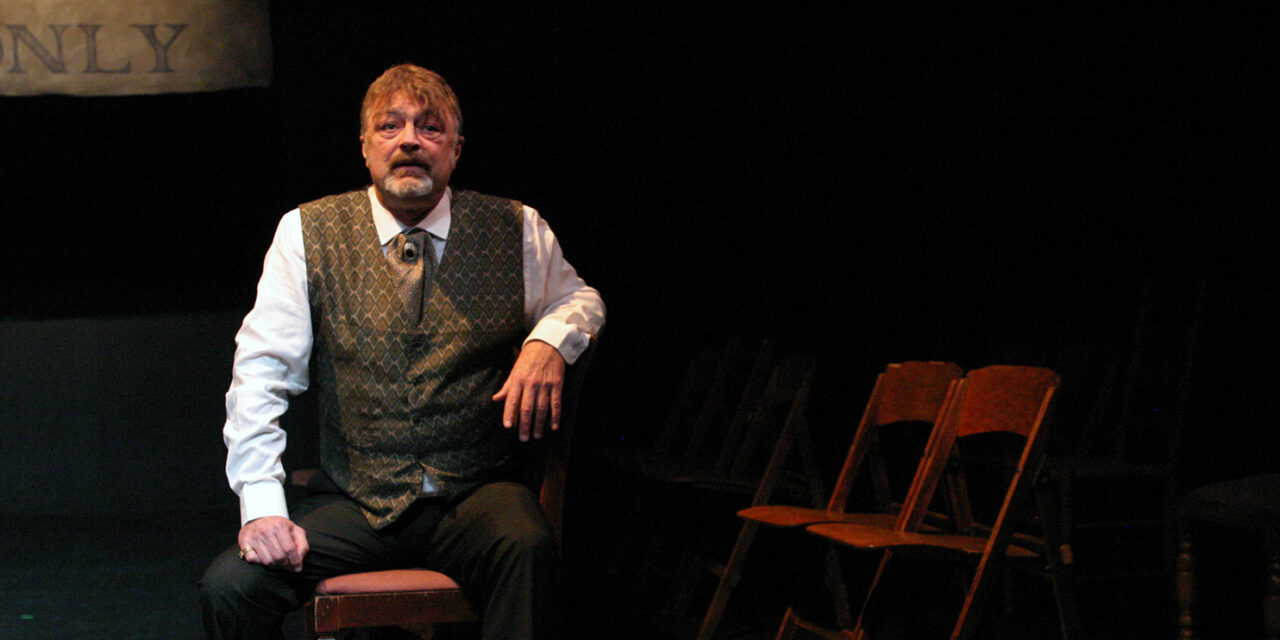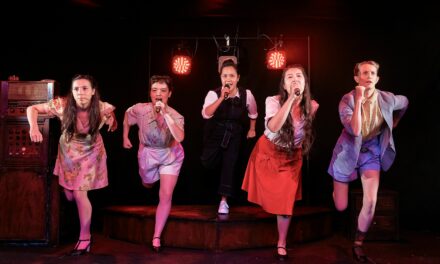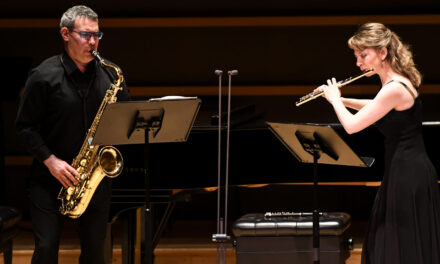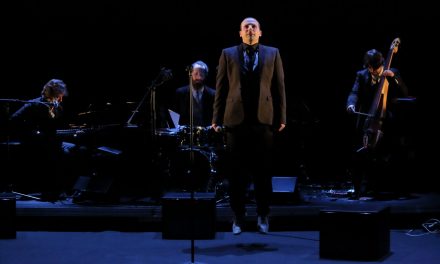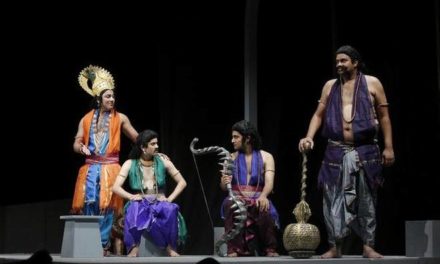It is the Odyssey Theatre’s 50th Anniversary Season and in honor of this wonderful accomplishment the company starts off with an intimate and powerful bang with Brian Friel’s “Faith Healer” as directed by Ron Sossi, the company’s artistic director. In the program notes Mr. Sossi points out that though the theatre launched in 1969 and the play didn’t appear on the scene until the late 1970s, the play seems a “most apt prelude to the[ir] retrospective” season due to its innovative role in developing what we now know as the ‘monologue play’. It was also the first play the company performed when they opened their new/current space 30 years prior on S. Sepulveda Blvd in Los Angeles.
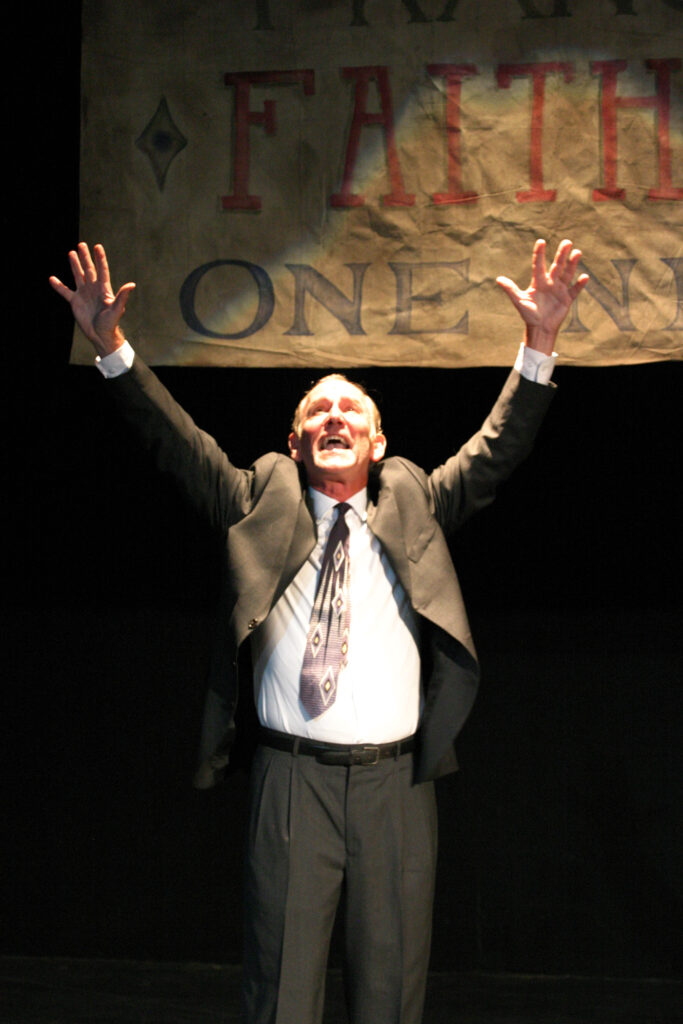
Paul Norwood as Fantastic Frank Hardy
Photo by Enci Box.
If you are familiar with the play, you are already familiar with its complexity and it’s oft-described “Rashomon-like qualities” that turns this three-person show into a mystery that promises to reveal deeper truths about relationships and how we experience our lives via memories then it does about the three characters we meet. The work more than suggests that the people who come into our lives possess aspects of it via stories that we can never remember quite as vividly – this is what makes the relationships in our lives so important and also so fraught with danger if we choose the people we may not be able to trust with those memories.
Frank Hardy is the faith healer – an Irishman who seems unable to go home again though not for any reasons we can clearly grasp in the play. He speaks first and so his is the record that we use to gauge the tales Grace and Teddy tell. That is until we hear from Grace and Teddy and start to wonder whether anyone in this trio actually can speak to the truth. As Frank, Paul Norwood comes across as a mild-mannered man who we can trust and one whose heart was broken when his mother died while he was on tour in Northern Scotland [a testimony that unravels later on]. His accent is barely audible and he hardly seems much of a schemer but that’s part of the magic of Mr. Norwood’s performance. As we hear from his partners in touring, if not a crime, we learn a great deal about his ability to speak with veracity and over time the choice to cast this man who seems harmless in the role of Frank [who appears to end up being anything but that] feels right.
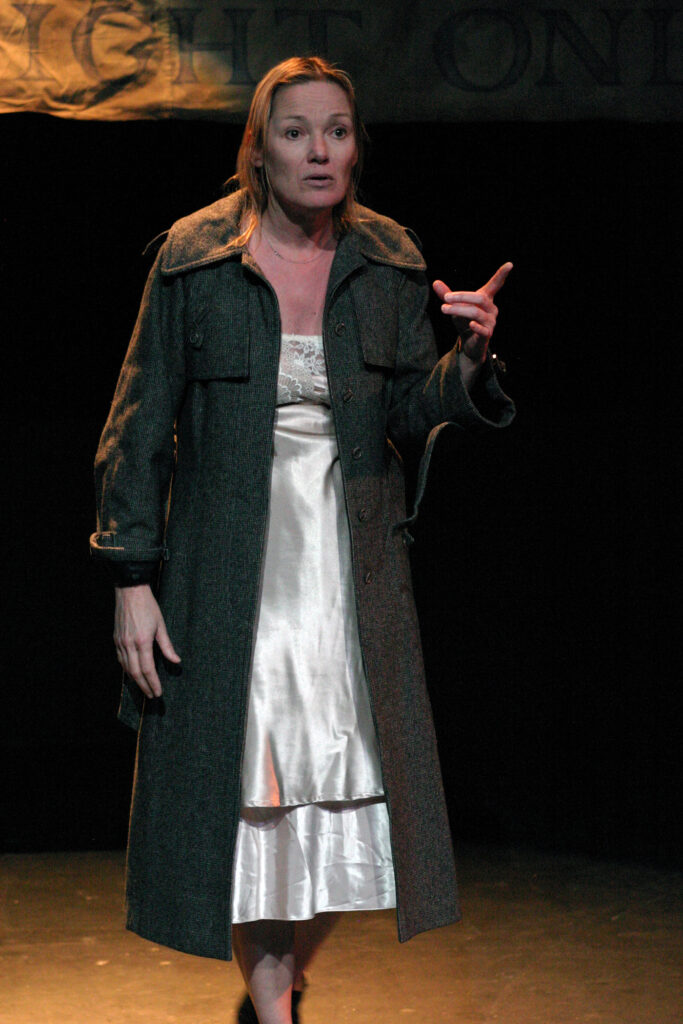
Diana Cignoni as Grace
Photo by Enci Box.
We meet Grace after Frank – Grace Hardy, according to her, but Frank has already referred to her as his mistress, not his wife and Diana Cignoni brings this woman to life with such anguish, such certainty, and despair that she holds us mesmerized in our seats. Her breakdowns are pure emotion gone wild but the actress is in such control, she is able to shift between emotional states without ever letting us see the mechanism that gets her there. She is a horrifying yet beautiful sight, holding the audience in a gaze that seems trapped is a deer-in-headlights moment that she may never recover from – the car, it seems, has already done its damage.
“Many, many, many times I didn’t exist for him.” She shares, “But before a performance this exclusion – no, it wasn’t an exclusion, it was an erasion – this erasion was absolute: he obliterated me. “
Grace has us convinced we have heard the worst of it all but then Teddy takes the floor at the top of the second act and what we might believe are the closest things to truth are revealed. Ron Bottitta plays Teddy and it would be all too easy to imagine spending easy hours if not days as Mr. Bottitta reviles us with tale after tale in Teddy’s cockney accent. We could even bear the most stringent pain under the tutelage of such a character and in many respects, we do for Teddy is the one member of this trio that seems capable of seeing things they way they were even as he seems the most culpable in his delusion about the role he played in all of this. He admits his energy fed Frank just as he admits he loved the both of them, though its possible he loved Grace more than Frank no matter how he phrases it.
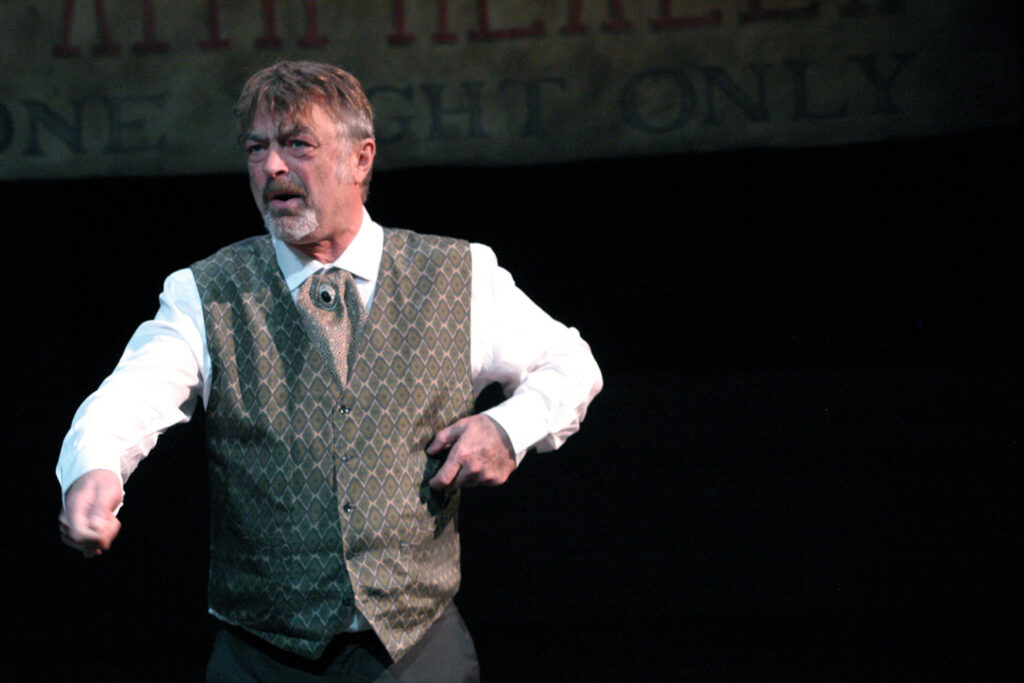
Teddy comes closest to telling us what happened but he still knows how to protect himself.
As he says, “Sure they should have split. Why didn’t they then? Don’t ask me. For God’s sake why didn’t I leave them and get myself something nice and simple and easy like – like – like a whistling dolphin? And what was the fighting all about in the end? Alright, you could say it was because the only thing that finally mattered to him was his work – and that would be true. Or you could say it was because the only thing that finally mattered to her was him – and I suppose that would be true too. But when you put the two propositions together like that – I don’t know – somehow they both become only half-truths, you know.”
The full truth might well be that Frank wouldn’t have had to focus on work and Grace wouldn’t have had to focus on him if Teddy had never decided it was worth his effort to put Frank on tour, to begin with. Frank is plagued with what he calls the “questionings” – thoughts that lead to doubts about whether or not he is actually a faith healer and what that could possibly mean.
“Am I endowed with a unique and awesome gift? – my God, yes, I’m afraid so. And I suppose the other extreme was Am I a conman? – which of course was nonsense, I think. And between those absurd exaggerations, the possibilities were legion.”
As sure as he was, his doubts and reality lead him to admit that nine times out of ten, nothing happened.
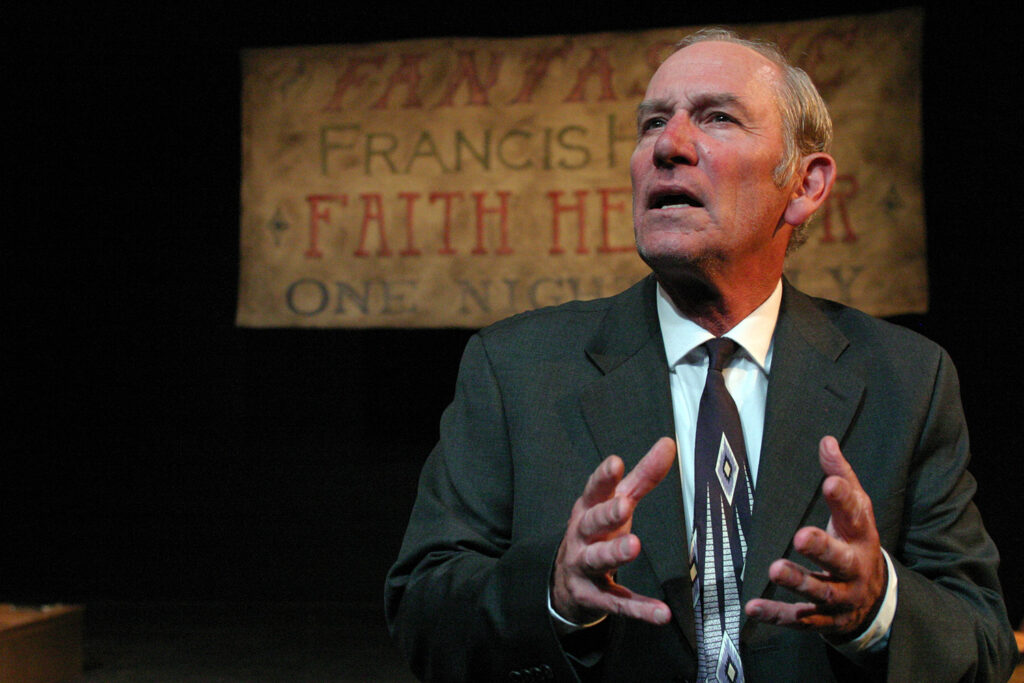
Paul Norwood as Fantastic Frank Hardy
Photo by Enci Box.
Whether Frank realizes it or not, all three characters seem to suffer from the same questionings. There are two other instances where all three seem to share some part of the same story but even in the first instance in Wales, all three deliver it with different shades. According to Frank and Grace, the former healed ten people. According to Teddy, that only transpired after the couple engaged in a screaming match where they tried their best to tear the other in two with their words and animosity. After that ten plus people came to their church and after Teddy rallied Frank and Frank healed them all to everyone’s amazement, the couple left Teddy in that desolate place and drove off to a hotel to celebrate without him.
In the other instance, all three vividly recall a ‘pub, a lounge bar, really, outside a village called Ballybeg’ in Ireland – their first stop in what was supposed to be a homecoming tour for Frank. Armed with the knowledge that Frank always knew whether something was going to happen or not at his healing “performances,” we are almost prepared to deal with what might have happened to Frank outside that lounge pub in Ireland but it takes a leap of the imagination to fully envision it and that is where Brian Friel reveals his mastery as he entangles us. We know something bloody and awful has happened to Frank because we’ve been made sure to see the axe, crowbar, mallet, and hayfork that are within reach of a party of young men of varying quality [per our narrators] but the play never tells us exactly what occurs so our imaginations are let loose to fill in the gaps in all of its morbid glory.
As I left the theatre, a lovely older couple admitted their admiration for the play though they went on to admit they felt they needed to look it up when they got home in order to understand what it is really about. All of us could make the same effort but it would be a shame to discover the singular truth to it all.
As Teddy advises us “Listen to me, dear heart, I’ll give you this for nothing, the best advice you’ll ever get – the one rule I’ve always lived by: friends is friends and work is work and never the twain shall meet as the poet says.”
He says this twice and no matter how emphatically, we know he broke that rule in this instance and that this breaking has haunted him. Frank admits that Teddy’s passion for his work was a “sustaining one” and Grace wonders whether she can live without Frank’s sustaining her. These three people had a kind of faith and love for each other that kept them going for over a decade but Teddy is the only one left in the end. How the heart breaks for Teddy – and in the end, that feels like more than enough reason to want to experience this story. It’s a beautiful one after all even though faith might ultimately be the thing that needs healing here – if it isn’t the thing that damaged these people the most in the end.
The creative team includes set designer Stephanie Kerley Schwartz, sound designer Christopher Moscatiello and costume designer Denise Blasor. The production manager is Josh La Cour. The technical director is Danny Felix. The stage manager is Owen Panno, and the assistant director is Anna Mader.
Performances of Faith Healer take place on Fridays and Saturdays at 8 p.m. and Sundays at 2 p.m. through May 12, 2019. Additional weeknight performances are scheduled on Wednesday, April 10; Thursday, April 18; and Wednesday, May 8, all at 8 p.m. Tickets range from $32 to $37; there will be “Tix for $10” performances, on Wednesday, April 10; and Friday, April 26. Additional discounts are available at select performances for seniors, students and patrons under 30; call theater for details.
The Odyssey Theatre is located at 2055 S. Sepulveda Blvd., West Los Angeles, 90025. For reservations and information, call (310) 477-2055 or go to OdysseyTheatre.com.
This post was written by the author in their personal capacity.The opinions expressed in this article are the author’s own and do not reflect the view of The Theatre Times, their staff or collaborators.
This post was written by Christine Deitner.
The views expressed here belong to the author and do not necessarily reflect our views and opinions.

